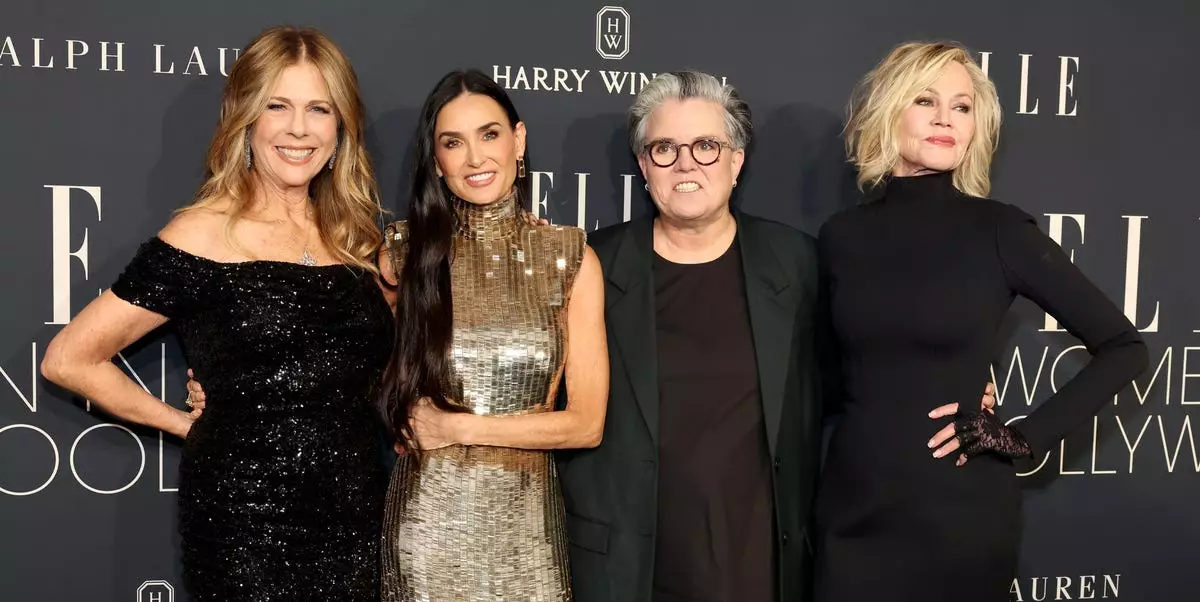The landscape of Hollywood has undergone substantial changes over the decades, but few moments capture the essence of female empowerment as poignantly as the recent ELLE Women in Hollywood event. This celebration, held in partnership with Ralph Lauren, Harry Winston, and TikTok, was not merely a tribute; it was an exposition of camaraderie, resilience, and a shared journey through time. At the forefront of this gathering was Demi Moore, a figure synonymous with bravery in Hollywood. Introduced by her co-stars Melanie Griffith, Rita Wilson, and Rosie O’Donnell, the event resonated with nostalgia and pride as they recalled their experiences while filming the beloved coming-of-age film *Now and Then*, released nearly thirty years ago.
This reunion wasn’t just about honoring a talented actress; it was an exploration of a unique cinematic narrative focusing on women—written by, directed by, and featuring women at a time when such stories were almost nonexistent. The heartfelt sentiments expressed by Griffith, O’Donnell, and Wilson encapsulated the impact *Now and Then* had, not only on their careers but also in portraying women’s stories that resonated across generations. This film served as a beacon of hope for many women who rarely saw themselves represented onscreen in complex roles.
At the event, anecdotes about Moore’s groundbreaking moments in Hollywood flowed freely. O’Donnell highlighted the cultural significance of Moore’s infamous Vanity Fair cover, where she posed nude while seven months pregnant. It was a moment that shocked society at the time but also paved the way for a broader and more nuanced acceptance of women’s bodies. Today, the red carpet has become a platform where the lines of modesty have blurred, and Moore’s bravery can be seen as the catalyst for that change.
Griffith’s observation regarding Hollywood’s limited roles for women resonated powerfully. The irony of Hawn’s character’s lament about the three roles available to women—“babe,” “district attorney,” and “Driving Miss Daisy”—vividly illustrates the long-standing stereotypes that have persisted in the film industry. However, Moore’s career has exemplified a refusal to be confined by these narratives. In a remarkable run of box-office successes such as *Ghost*, *A Few Good Men*, and *Indecent Proposal*, Moore showcased a complex portfolio of roles that not only entertained but also challenged societal perceptions of women.
As attention returned to Moore’s current projects, Griffith accurately dubbed its resurgence a “Demi-ssance.” This clever play on words reflects more than just a revival of her career; it underscores the distinct trajectory of an actress who has consistently defied the limitations placed upon her by an industry often resistant to change. Moore’s involvement in the production of powerful films like *G.I. Jane* and *If These Walls Could Talk* illustrates her multifaceted talent while inspiring countless others in the entertainment industry to tell stories that matter.
The evening’s nostalgia was palpable, yet it served as a reminder that while progress has been made, the fight for gender representation in Hollywood is far from over. This reunion was as much about celebrating past achievements as it was about igniting conversations on the future landscape of female storytelling in cinema.
As the event unfolded, images of Griffith, Wilson, Moore, and O’Donnell posing together evoked a sense of unity and deep-rooted friendship. Their shared experiences on set and beyond have undoubtedly created bonds that transcend the screen. This palpable unity is emblematic of what female empowerment looks like in a male-dominated industry. With events like these that celebrate female achievements, the hope is to inspire further change—creating a bigger platform for women in film and reminding audiences of the power found in sisterhood.
Overall, the ELLE Women in Hollywood event was not just a celebration of Moore but an affirmation of the strides made in showcasing women’s narratives in film. As Hollywood continues to evolve, the contributions of trailblazers like Demi Moore must be recognized not only for their artistic merit but also for their role in reshaping the industry landscape. Their legacy needs to inspire future generations to tell bold, authentic stories that reflect the varied experiences of women around the globe.

